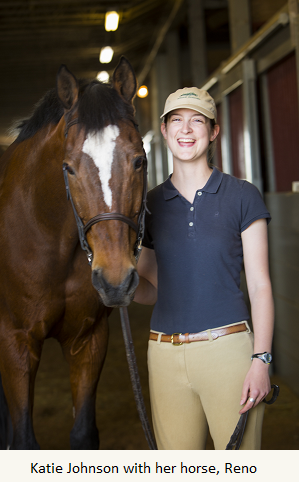‘Catalysts for self-discovery’; Combining a love of horses with social work to do good
 “Horses, through their behaviors and responses, can reveal things about the client’s personality or demeanor that he or she was unaware of,” says Katie Johnson, William Woods University senior studying social work and equestrian studies.
“Horses, through their behaviors and responses, can reveal things about the client’s personality or demeanor that he or she was unaware of,” says Katie Johnson, William Woods University senior studying social work and equestrian studies.
Johnson’s ultimate plan is to use these two areas of study to assist veterans and at-risk children and adolescents through equine therapy.
“What I love about Social Work is how it looks at individuals as human beings, regardless of their flaws. It doesn’t expect people to be perfect, but it strives to teach them how to help themselves to fulfill their full potential,” Johnson said.
“What I love about how these two programs are working together is how they each teach the behaviors, dynamics, and practices necessary to work with their respective ‘clients.’ I can then take what I learn in both programs and combine that knowledge into an effective method of teaching and treatment that utilizes the horses as catalysts for the humans’ self-discovery.”
Marian Swindell of The New Social Worker writes of the great things and remarkable changes that therapeutic riding can bring to social work clients of almost every population.
Swindell writes, “The explanation for the success rate is simple. A special bond is formed between a child and a horse. Children who have not progressed in a conventional therapeutic setting often excel with therapeutic riding.”
Swindell cites various studies, including one by Kaiser, Smith, Heleski and Spence (2006), which found that anger in adolescent males significantly decreased after an 8-week riding therapy program.
“Horses can also help these individuals gain self-confidence, work on communication, develop leadership skills and build trust,” Johnson said.
At William Woods University, undergraduate students often combine their life-long passion for horses with another area of expertise. Equestrian studies students often also study a second major like media, photography, pre-veterinary science or get a master’s degree in equestrian education.

